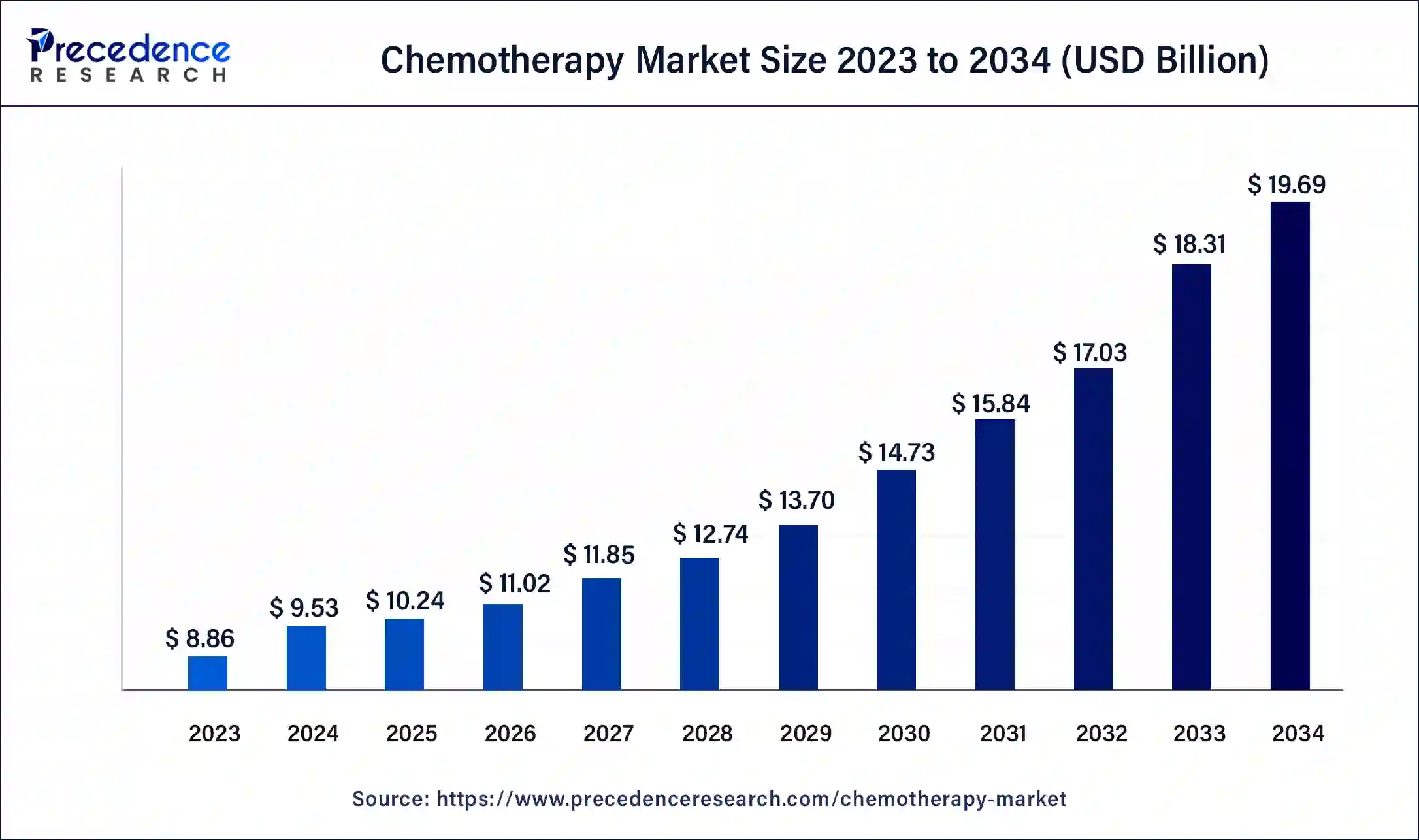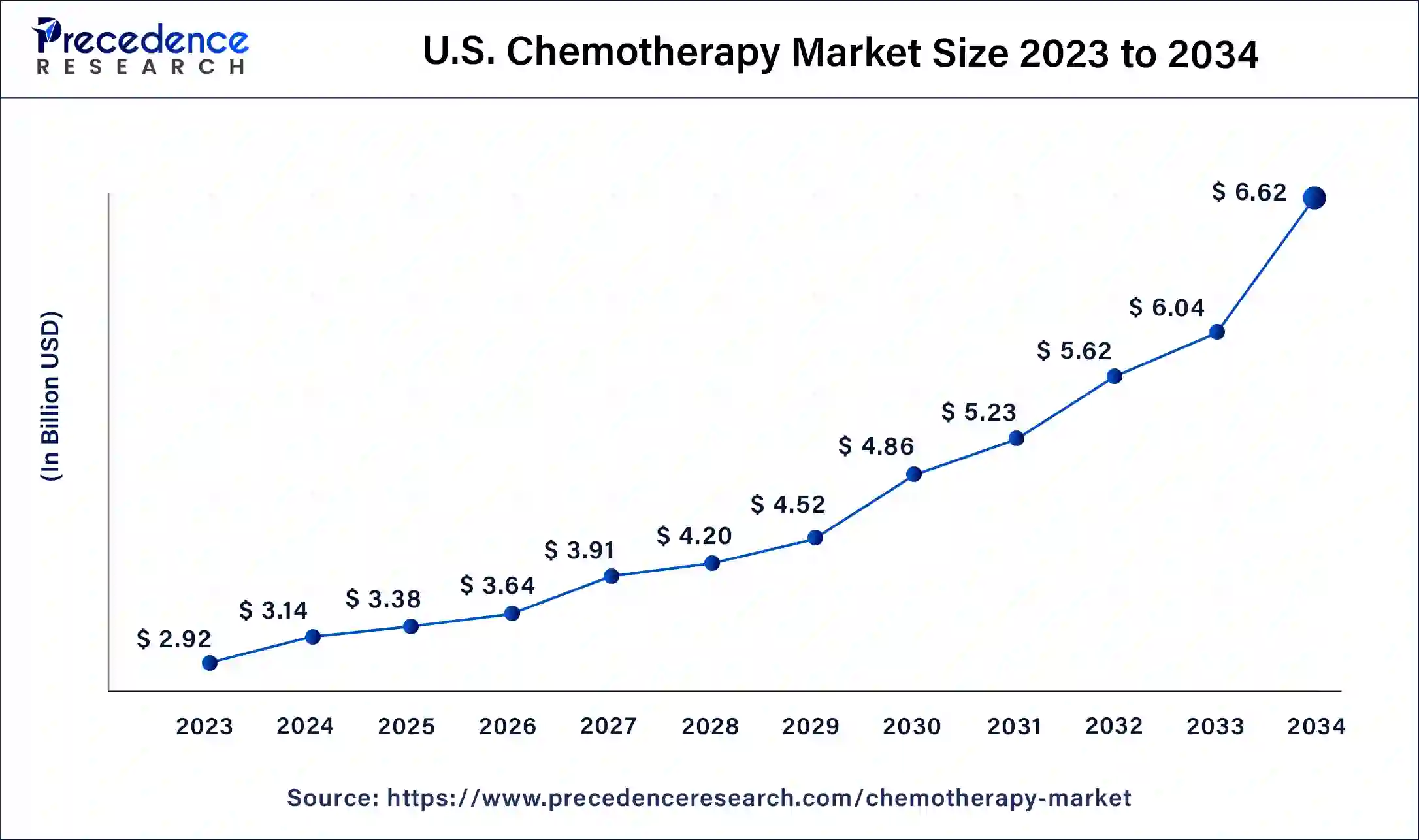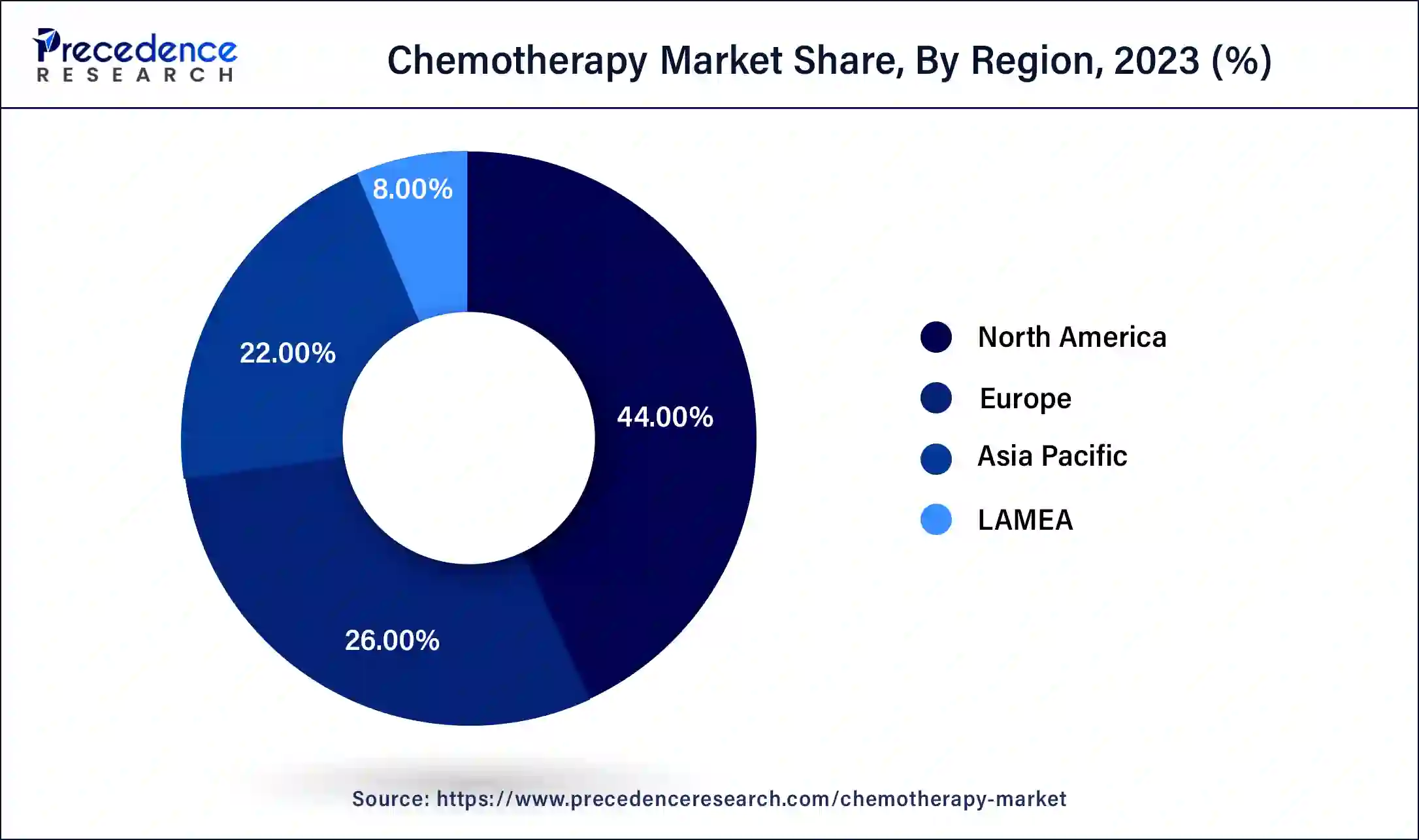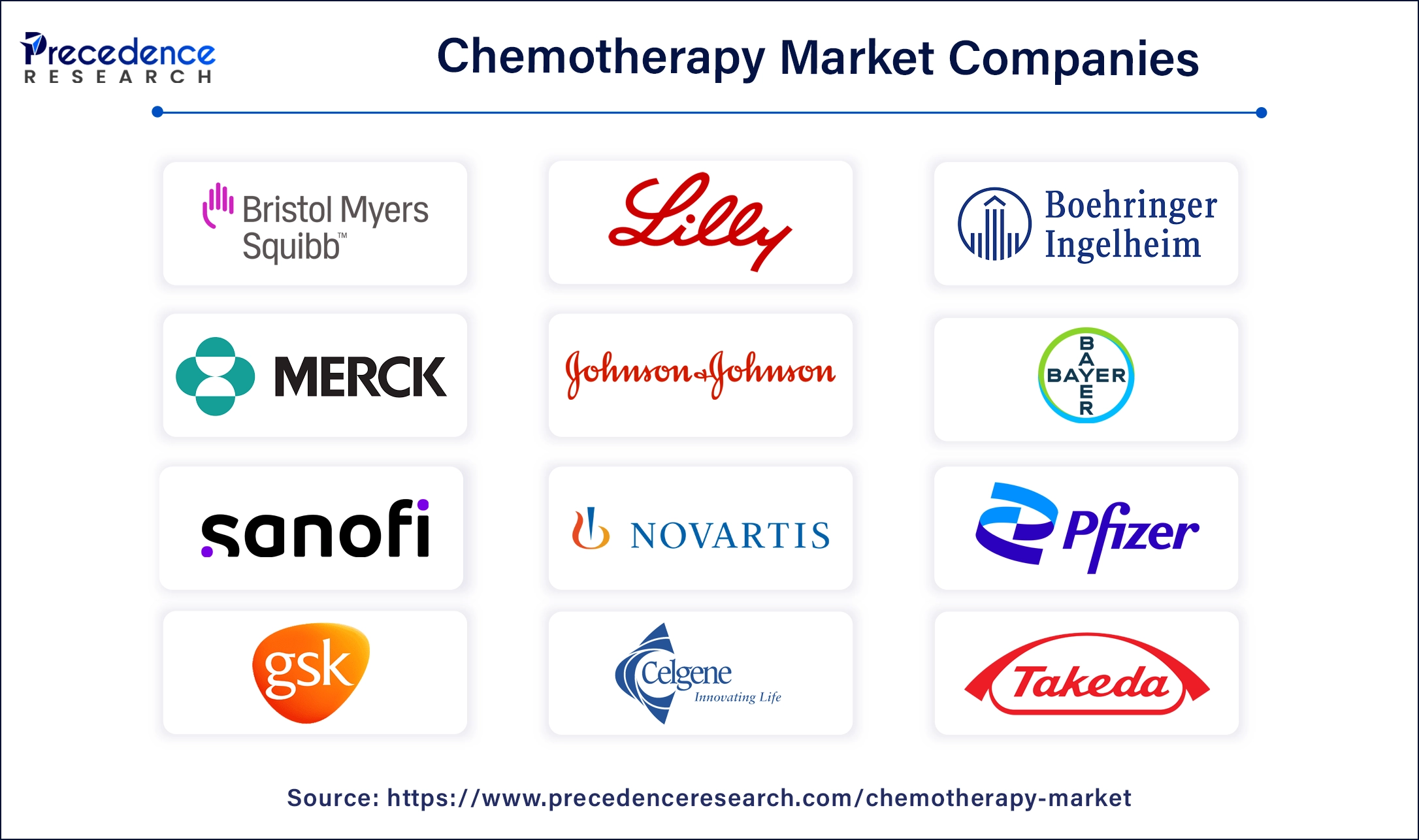Chemotherapy Market Size and Forecast 2025 to 2034
The global chemotherapy market size was estimated at 9.53 billion in 2024 and is predicted to reach around USD 19.69 billion by 2034, expanding at a CAGR of 7.53% from 2025 to 2034. The North America chemotherapy market size reached USD 4.19 billion in 2024. The market for cancer chemotherapy is anticipated to expand due to advances in drug delivery and development and the shift toward biologics.

Chemotherapy Market Key Takeaways
- The global chemotherapy market was valued at USD 9.53 billion in 2024.
- It is projected to reach USD 19.69 billion by 2034.
- The chemotherapy market is expected to grow at a CAGR of 7.53% from 2025 to 2034.
- North America led the global chemotherapy market with the largest market share of 44% in 2024.
- Asia Pacific is expected to grow at the fastest rate in the market over the projected period.
- By drugs, the alkylating agent segment dominated the market in 2024.
- By indication, the leukemia segment led the market in 2024.
- By Indication, the breast cancer segment is expected to grow at a notable rate in the market during the forecast period.
- By route of drugs, in 2024, the oral segment dominated the global market.
- By route of drugs, the intravenous segment is expected to grow at the fastest rate in the market over the forecast period.
- By end user, the hospital segment dominated the market in 2024.
- By end user, the online pharmacy segment is expected to show the fastest growth in the market throughout the forecast period.
U.S. Chemotherapy Market Size and Growth 2025 to 2034
The U.S. chemotherapy market size was exhibited at USD 3.14 billion in 2024 and is projected to be worth around USD 6.62 billion by 2034, poised to grow at a CAGR of 7.74% from 2025 to 2034.

North America led the global chemotherapy market in 2024. The chemotherapy market in North America is propelled by the increasing incidence of cancer in the U.S. The substantial presence of global vendors in the region and the accessibility of chemotherapeutic treatments are improving the market growth. Furthermore, the anticipated approval of combination therapies currently in the advanced stages of clinical trials is expected to boost the chemotherapy treatment market in North America.
- In May 2024, Zydus Lifesciences Ltd announced an exclusive licensing and supply agreement with MSN Laboratories for the generic cancer treatment drug Cabozantinib tablets for the US market. The company's wholly-owned subsidiary, Zydus Lifesciences Global FZE, has entered into an exclusive licensing and supply agreement with MSN Laboratories for Cabozantinib tablets for the U.S. market, Zydus Lifesciences Ltd said in a regulatory filing.

Asia Pacific is expected to grow at the fastest rate in the chemotherapy market over the projected period. This growth is driven by expanded government awareness programs and increasing healthcare expenditures in the region. The availability of skilled healthcare professionals and the growing demand for chemotherapy drugs will further support market expansion. Also, the rising accessibility of generic medications is expected to moderate the market growth in this sector.
China's chemotherapy market held the largest share, while India's chemotherapy market was the fastest-growing in the Asia-Pacific region. Government cancer reimbursement policies in India are anticipated to fuel market growth further.
- In September 2023, Gloria Biosciences announced that Zimberelimab was Approved in China for the Treatment of Recurrent or Metastatic Cervical Cancer. Zimberelimab is the first and only immune checkpoint inhibitor (ICI) antibody approved in China for cervical cancer and the third one globally.
Market Overview
Chemotherapy involves using medications or drugs to treat cancer by inhibiting the proliferation of cancer cells and the multiplication of tumors within the body to cure cancer and alleviate its symptoms. Cancer is treated using targeted and immune-based therapies. Combination or multitargeted therapy, which adheres to the principles of fractional kill and the Goldie-Coldman hypothesis, is generally preferred over single-agent treatment.
Chemotherapy is also used alongside radiation therapy before surgery or for curative purposes in treating cancers of the head, neck, lung, and anus. The mechanism of action for chemotherapeutic drugs includes attacking rapidly dividing cancer cells, damaging their genetic material, and sometimes blocking essential chemicals needed for cell division.
Chemotherapy Market Growth Factors
- Rising cancer prevalence among most of the population is expected to drive the growth of the chemotherapy market.
- Efforts taken by government organizations to support chemotherapy treatment can lead to market growth.
- Rising healthcare costs for infrastructure and funding from pharma companies can fuel market growth shortly.
Market Scope
| Report Coverage | Details |
| Market Size by 2034 | USD 19.69 Billion |
| Market Size in 2025 | USD 10.24 Billion |
| Market Size in 2024 | USD 9.53 Billion |
| Market Growth Rate from 2025 to 2034 | CAGR of 7.53% |
| Largest Market | North America |
| Base Year | 2024 |
| Forecast Period | 2025 to 2034 |
| Segments Covered | Drugs, Indication, Route of Drugs, End User, and Regions |
| Regions Covered | North America, Europe, Asia-Pacific, Latin America, and Middle East & Africa |
Market Dynamics
Driver
Combination therapies
The rise in drug resistance has prompted the creation of combination therapies. These therapies can potentially diminish drug resistance since tumors are less likely to resist multiple drugs simultaneously. Numerous vendors are working on developing a combination therapy that includes chemotherapy drugs in addition to targeted therapies. Most of these combination therapy drugs are currently in Phase III clinical trials and are anticipated to receive marketing approval within the forecast period. The development of combination therapies is a significant trend expected to drive the growth of the chemotherapy market.
- In April 2024, Immunity Bio, Inc., an immunotherapy company, announced positive overall survival results in the QUILT 3.055 study of 2nd- and 3rd-line NSCLC patients who progressed Combined With checkpoint inhibitor therapy (pembrolizumab, nivolumab, or atezolizumab) and standard-of-care chemotherapy is to be discussed during the upcoming conference call.
Restraint
High costs in R&D
The high costs involved in the research and development of chemotherapeutic drugs and new cancer treatments constrain the market. Additionally, the necessity for expensive clinical trials to approve these drugs is expected to impact the market. Stringent regulatory requirements for drug approval and the expiration of patents for cancer and medications have reduced original manufacturers' market share and revenue. The side effects associated with chemotherapy drugs and the emergence of drug resistance are likely to restrict the chemotherapy market growth further.
Opportunity
Innovative technology development
Chemotherapy has played an important role in prolonging the lives of cancer patients beyond what would have otherwise been possible. Recent advancements in the chemotherapy market involve injecting cancer-fighting drugs, in the form of customized nanoparticles, directly into affected areas while sparing healthy cells. Furthermore, this method has been shown to preserve healthy tissue while targeting and eliminating cancer cells. Medical professionals can utilize photon lasers to monitor the release, duration, and distribution of these nanoparticles, equipped with tubes and pores, as they treat cancerous cells in the patient's body.
- In March 2024, Purdue researchers create biocompatible nanoparticles to enhance systemic delivery of cancer immunotherapy. The nanoparticles slowly release drugs that induce immunogenic cell death, or ICD, in tumors. ICD generates tumor antigens and other molecules to bring immune cells to a tumor's microenvironment. The researchers have attached ATP to the nanoparticles, which also recruit immune cells to the cancer to initiate anti-tumor immune responses.
Drugs Insights
The alkylating agent segment dominated the chemotherapy market in 2024. Alkylating agents cause DNA strand breakage, abnormal base pairing, or cross-linking of DNA strands, inhibiting cell division. These agents are typically classified as nonspecific in the cell cycle phase, meaning they can eliminate cells at various cell cycle stages. Additionally, the drug segment will experience growth due to increased research in the drug pipeline and higher healthcare expenditures.
Indication Insights
The leukemia segment led the chemotherapy market in 2024. The rising incidence of breast cancer is driving the demand for chemotherapy. Leukemias, which can cause symptoms such as fatigue, weight loss, frequent infections, and easy bruising or bleeding, exhibit varied treatment outcomes. Slowly progressing leukemias might only require observation. In contrast, aggressive leukemias often need a combination of chemotherapy, radiation therapy, and stem cell transplants.
- In March 2024, Novartis is set to launch a chronic myeloid leukemia drug in India. The drug is slated to be manufactured at Novartis' overseas manufacturing facilities and will be imported into India. The imminent launch of Asciminib, the first-in-class treatment for chronic myeloid leukemia (CML) targeting the ABL myristoyl pocket.
The breast cancer segment is expected to grow notably in the chemotherapy market during the forecast period. The incidence of breast cancer is increasing at a noteworthy pace. This segment growth is fueled by the rising prevalence of breast cancer among women, the availability of diverse treatment options, and advancements in breast cancer diagnostics using state-of-the-art technologies. Key risk factors include being female and advancing age, as most breast cancer cases are diagnosed in women aged 50 and above. Some women may develop breast cancer without being aware of any other risk factors.
Route of Drug Insights
The oral segment dominated the global chemotherapy market. This is because These drugs, available in pill, capsule, or liquid form, are taken orally. Oral chemotherapeutic agents often exhibit higher efficacy compared to topical applications. This method also provides convenience, as patients can take their medication at home rather than needing to go to a hospital or clinic for infusion therapy.
The intravenous segment is expected to grow at the fastest rate in the chemotherapy market over the forecast period. The intravenous route has experienced the most rapid growth rate. Chemotherapy drugs administered intravenously act faster than oral and topical treatments because they are immediately absorbed into the bloodstream.
End-Users Insights
The hospital segment dominated the chemotherapy market in 2024. This can be attributed to the specialized treatments provided by these facilities and the presence of skilled healthcare professionals. The smooth progress in advanced medical equipment is propelling the fastest growth rate in the chemotherapy market. Additionally, the rising incidence of chronic illnesses among the expanding elderly population is driving market expansion within hospitals.
The online pharmacy segment is expected to show the fastest growth in the chemotherapy market throughout the forecast period. An online pharmacy, also known as an Internet or mail order pharmacy, is a pharmacy that functions via the Internet and delivers orders to customers through mail, shipping services, or its online portal. Online pharmacies encompass pharmacy benefits managers, which are entities responsible for managing corporate prescription drug plans.
Chemotherapy Market Companies

- Pfizer Inc.
- Sanofi SA
- Johnson & Johnson Services Inc
- GlaxoSmithKline Plc.
- Novartis AG
- Eli Lilly & Company
- Merck & Co.
- Teva Pharmaceuticals
- Celgene Corporation
- Bayer AG
- Bristol-Myers Squibb
- Boehringer Ingelheim
- Takeda Pharmaceutical Company Limited
- Schering-Plough
- Chemo Espana SL
- Others
Recent Developments
- In November 2022, At the San Antonio Breast Cancer Symposium 2022, AstraZeneca will present new data supporting its goal to redefine care. Fifty-five presentations, including five oral presentations, will highlight 12 AstraZeneca products and potential new products, showcasing the company's expanding leadership across various subtypes and stages of breast cancer.
- In May 2022, Gland Pharma introduced bortezomib for injection to the U.S. market. Injections of bortezomib are used to treat some cancers, such as multiple myeloma and mantle cell lymphoma.
Segments Covered in the Report
By Drugs
- Alkylating Agents
- Antimetabolites
- Anti-Tumor Antibiotics
- Topoisomerase Inhibitors
- Mitotic Inhibitors
- Others
By Indication
- Leukemia
- Lymphoma
- Breast Cancer
- Ovarian Cancer
- Lung Cancer
- Myeloma
- Sarcoma
- Others
By Route of Drugs
- Oral
- Intravenous
By End User
- Hospitals
- Research institutes
- Others
By Geography
- North America
- Asia Pacific
- Europe
- Latin America
- Middle East & Africa
For inquiries regarding discounts, bulk purchases, or customization requests, please contact us at sales@precedenceresearch.com
Frequently Asked Questions
Ask For Sample
No cookie-cutter, only authentic analysis – take the 1st step to become a Precedence Research client
 Get a Sample
Get a Sample
 Table Of Content
Table Of Content
 sales@precedenceresearch.com
sales@precedenceresearch.com
 +1 804-441-9344
+1 804-441-9344
 Schedule a Meeting
Schedule a Meeting